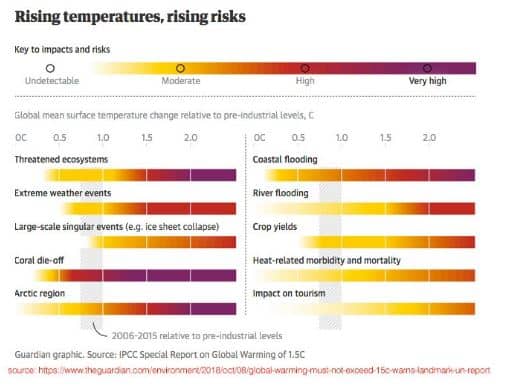
President’s Blog: IPCC report shows the need for biogas is greater than ever
 World Biogas Association President David Newman evaluates the latest global report on climate change and considers the role of biogas in reducing emissions
World Biogas Association President David Newman evaluates the latest global report on climate change and considers the role of biogas in reducing emissions
Earlier this month, the United Nations Intergovernmental Panel on Climate Change (IPCC) published a sobering report with the catchy title “Global warming of 1.5°C: an IPCC special report on the impacts of global warming of 1.5°C above pre-industrial levels and related global greenhouse gas emission pathways, in the context of strengthening the global response to the threat of climate change, sustainable development, and efforts to eradicate poverty”.
The report states that we have already reached 1.0°C of global warming due to human activities and that we are likely to reach an average rise in global temperatures of 1.5°C within 12 to 34 years. If we were to stop reducing emissions today, we would without doubt reach an increase in temperatures of 2°C by 2100.
The consequences of an increase in temperatures to 2°C are significant. Compared to a 1.5°C increase by 2100, an increase to 2°C would lead to an acceleration of environmental, social and economic impacts across the globe. Among others, these include: extreme temperature incidents, especially in the tropics; rising sea levels due to the melting of polar ice masses; loss of landmass and coastal resources; loss of warm-sea coral reefs; increased ocean acidification; increased risk of poverty; reduced food production, especially of staple field crops; reduced economic growth; more localised precipitation and flooding; and a greater spread of diseases and heat-related illnesses.
 The report reads like the warnings you now get on the back of cigarette packets. Don’t read it before bedtime: you won’t get to sleep. However, the report does also lay out a diagnosis of what needs to be done to prevent temperatures rising beyond 1.5°C: a severe cut in emissions now, not at some distant time in the future.
The report reads like the warnings you now get on the back of cigarette packets. Don’t read it before bedtime: you won’t get to sleep. However, the report does also lay out a diagnosis of what needs to be done to prevent temperatures rising beyond 1.5°C: a severe cut in emissions now, not at some distant time in the future.
The IPCC says in its report:
Pathways limiting global warming to 1.5°C with no or limited overshoot would require rapid and far-reaching transitions in energy, land, urban and infrastructure (including transport and buildings), and industrial systems. These systems transitions are unprecedented in terms of scale, but not necessarily in terms of speed, and imply deep emissions reductions in all sectors, a wide portfolio of mitigation options and a significant upscaling of investments in those options […] Modelled pathways that limit global warming to 1.5°C with no or limited overshoot involve deep reductions in emissions of methane and black carbon (35% or more of both by 2050 relative to 2010).
This last sentence is of particular relevance to us in the biogas world, because capturing methane (by treating food waste, sewage, agricultural crops, and waste streams) is what we do.
In its conclusion, the report states that we have around 12 years to make drastic cuts to emissions if we wish to avoid global temperatures spinning out of control. Professor Jim Skea, the IPCC co-chair, states: “Limiting warming to 1.5 degrees is possible within the laws of chemistry and physics but doing so would require unprecedented changes”. In other words, we need the political will to make those unprecedented changes, which to date has been lacking.
I was made aware of this during my recent stay in Johannesburg, South Africa for WasteCon 2018. Several speakers outlined how the South African government would not be able to meet its climate targets due to abundant cheap coal and the need to bring energy to its huge and growing population. Imagine asking those on very low incomes to subsidise renewable energies when they don’t have food on the table! According to official figures, 27% of the working population in South Africa is unemployed, and many more unregistered unemployed are not even counted.
And yet South Africa is an African powerhouse, the leading economy on the continent. It has vast potential to install solar energy, biogas (from its food, sewage and farm wastes), and wind turbines along its enormously long coastline, but currently 80% of its electricity derives from coal and only 7% from renewables. Paradoxically, South African trade unions, who have a powerful political voice, oppose investments in renewables because of potential job losses in the coal industry.
All this is to say how challenging it is to meet the 1.5°C limit to global warming and how easy it could be for us to surpass this limit in the next decade. Biogas, however, can provide fast-to-implement and cost-effective solutions that can reduce around 15-20% of global emissions through treating all biodegradable wastes – where there is the political will to do so. As the example from South Africa shows, political will is often fragile and compromised by internal politics and economics, despite the IPCC’s recognition that we have no longer any time to lose. It is turning that recognition into action that is the World Biogas Association’s raison d’être, and we will continue to make this our mission.

